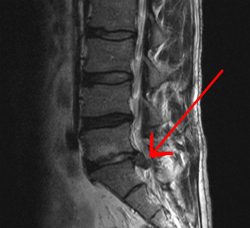Pinched Nerve vs Bulging Disc Meaning
What is a pinched nerve?
The term ‘pinched nerve‘ actually refers to any condition where compression of the nerve causes a range of sensory (‘feeling’) and motor (‘movement’) related symptoms in the affected area. While a pinched nerve if often believed to affect the spinal nerves only, due to compression between parts of the spine, it can actually affect any nerve in the body. The severity of the symptoms will depend on the site that is affected, the extent of the nerve compression, movement or other aggravating factors as well as duration of the compression.
A nerve transmits electrical impulses to and from the brain usually through the main pathway, known as the spinal cord or directly to the brain and brain stem. These nerve impulses carry sensations (pressure, pain, heat) to the brain and signals from the brain causes different actions like muscle movement. Nerves are embedded within the body, surrounded by other structures like bone, muscles, tendons, ligaments and connective tissue. If any of these surrounding structures impinges on the nerve, the compression will distort the signals in the nerve. The nerve compression may occur at the nerve root or along the course of the nerve.
What is a bulging disc?
A bulging disc is frequently present in the neck or the lower back (Picture 1). There are several causes of bulging discs, like bad posture, spinal arthritis, trauma, lifting heavy weights, frequent bending movements at work, and so on, which lead to neck, lower back, or middle back pain. However, bad posture at work forms the most important cause of bulging discs and is treated as an occupational hazard. Injury to the soft tissues of the spine, like ligaments or muscles, may also lead to bulging discs due to abnormal movement between the affected vertebrae. Occupations or sports involved in lifting heavy weights or frequent bending movements, also cause bulging discs, but this is mostly seen after a prolonged duration of such activities. It has been evidently seen, that unaccustomed lifting of weights, causes major issues rather than regular weight-lifting by people, who are physically used to this type of activity. Thus, there is no reason for daily weight lifters (occupational or sports related) to worry about this at all.

Picture 1: Bulging disc in lower back on MRI
(Source: Wikimedia Commons)
The frightful phenomenon of getting a disc bulge just after lifting a heavy weight, is a quite rare phenomenon. In most such instances, the severe back pain, is often due to a neck spasm or back spasm. Moreover, a severe disc bulge would rather cause loss of sensation or paralysis, rather than pain. Hence, we must understand, that discs and vertebrae, have a robust spinal anatomy, and trivial injuries or circumstances are just not enough to cause damage to this structure.
Common Signs & Symptoms of a Pinched Nerve
Symptoms may vary depending on the nerve affected, as well as the site of the compression on the nerve. Some common signs and symptoms include :
- Numbness
- Tingling
- “Pins and needles” sensation
- Pain
- Partial loss of function like muscle weakness or lack of coordination
Paresthesia, a common term for numbness, tingling or the “pins and needles” sensation may be caused by a number of factors and is not always due to a pinched nerve. In the case of a pinched nerves, not all of the above signs and symptoms may be present simultaneously. Symptoms of a pinched nerve may persist even after the cause of the nerve compression has been removed due to inflammation of the nerve.
Diagnosis and Investigation of Pinched Nerves
While the signs and symptoms of a pinched nerve along with a neurological examination may be relevant in diagnosing nerve compression, it is important to consider other diagnostic procedures such as :
- Magnetic Resonance Imaging (MRI)
- Electromyography (EMG) to measure the electrical strength in muscles.
- Nerve conduction study where a mild electrical shock is induced on the skin to test nerve impulses.





